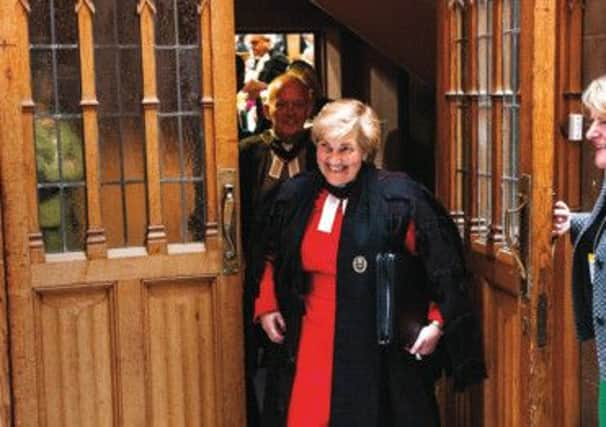Church of Scotland bid to bridge gay minister divide


Prof David Fergusson, principal of Edinburgh University’s divinity school, New College, said that unless the Kirk’s General Assembly agreed on a compromise it could take the Church a “generation to resolve” differences between traditionalist and revisionist sides of the debate.
Insisting that it was important that neither side should “enforce a victory” over the other, the academic has tabled an amendment for the debate that attempts to navigate a middle way between the two options put forward in a Kirk committee report.
Advertisement
Hide AdAdvertisement
Hide AdTraditionalists favour an option that keeps the status quo, that gay clergymen should be celibate, but revisionists want gay ministers to be treated in the same way as heterosexual ministers.
But the amendment places a greater emphasis on a presbytery’s right to exercise a conscience clause, allowing them to decline to appoint a gay minister if they do not want to.
Fergusson said that this “mixed economy” approach would give the Kirk space in which to discuss the issue further without causing a major divide: “What I think we’re lacking so far is further reflection on the nature of the Church as a community in which we can manage disagreement while maintaining unity with one another, and I’d like to see further work carried out, which would be crucial to consideration of these matters.”
The row over homosexual ministers was sparked in 2009 when the Assembly voted to uphold the appointment of openly gay minister Rev Scott Rennie to Queens Cross Church in Aberdeen.
The decision prompted a further vote on the issue in 2011, which saw the Assembly agree to allow openly gay ministers appointed prior to 2009 to remain in their posts, but placed a moratorium on further appointments and establish a theological commission to examine the implications in allowing further appointments.
The conclusions of the commission’s report will form the basis of tomorrow’s debate. Up to 60 congregations have indicated that they might leave the Church of Scotland if the revisionist stance is voted through.
Fergusson said that while he was sympathetic to the revisionist group, he felt it was not time to draw a line under the debate.
He said: “I do think we need to clarify where we’re at, and have recognition of the diversity that already exists within the Church, but I don’t believe it’s time for final resolution or victory for any one party, I don’t think it would be in the interests of the Church.
Advertisement
Hide AdAdvertisement
Hide Ad“I think it may take another generation for us to resolve this. We’re not alone; almost all the mainstream churches in the Western world are facing similar disagreements over these issues.
“The arguments are out there, I don’t think there’s any resolution available that will end disagreement in the short term, and I think we need to recognise that.”
The row has already seen two Kirk congregations and a handful of ministers leave the Church in protest at the move.
The Rev Ian Watson, minister of Kirkmuirhill, near Hamilton and an outspoken critic of the revisionist stance, rejected Fergusson’s proposal. He said: “I think that the theological commission has spent two years considering the way ahead and they have provided the Church with a very carefully thought-through report, which presents the two options available to the Church in a very clear way and therefore it’s almost disrespectful to the commission itself, to think that others can come up with a so-called compromise position almost overnight.”
He said that Kirk evangelicals and traditionalists would support the option to reject the revisionist stance and that “anything short of that will be a very great disappointment.”
In the event that the Assembly does vote to allow openly gay clergy, the decision will go out to presbyteries to vote on, under what is known as the Barrier Act, and it is possible the move could be halted there.
A minister on the revisionist side said that the traditionalists did not recognise the diverse nature of the Kirk: “These guys are more interested in trying to keep the Church together, trying to maintain unity, but only if the unity is what they believe. There’s no room for freedom of expression. Whereas the revisionist side is trying to find a way where they can all live together. I worship in the broad church, there has always been a broad Church.”
Radical move needed to tackle Kirk pension fund deficit
THE Kirk is to make radical changes to its pension schemes to help tackle a major deficit in its funds.
Advertisement
Hide AdAdvertisement
Hide AdMinisters and employees will have to pay more into the Church of Scotland’s pension scheme as it moves from a final salary version to a contribution scheme.
A 2009 valuation of the church’s pension schemes had revealed that there was a projected deficit of £29.1 million, and the Council of Assembly had been working to pay down this shortfall and find ways of managing it.
However, the council admitted in its report that it had failed to reduce this figure: “The results of the latest valuation, as at 31 December 2012, are awaited but early discussions with the pensions trustees – reported to the 2012 General Assembly – indicated that the overall deficit would increase significantly.
“The Council of Assembly and the employing agencies are therefore faced with the knowledge that, in spite of pension deficit repayments totalling over £11m over the last three years, the deficit has not shrunk but will have grown.”
It added that the cost of future of pension provision would continue to rise if no changes were made, and therefore arrangements would have to be reviewed to “ensure that deficits can be repaid, liabilities managed and future pension provision protected as far as possible”.
The report recommended that existing schemes for Kirk employees and those who work for its charity wing should be closed to further contributions.